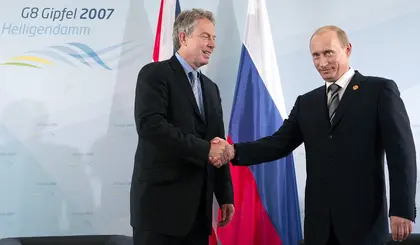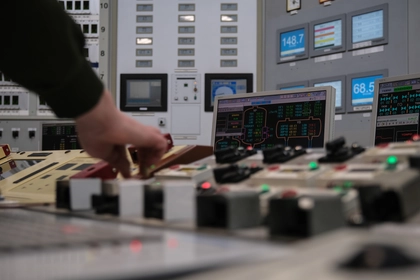The UK was warned of a “worst case" scenario of “Russian intervention in Ukraine” way back in 2001 but ignored Kyiv’s fears about President Putin’s ambitions, newly released documents reveal.
The prophetic warnings made to then-prime minister Tony Blair, by senior foreign policy adviser Roger Liddle, are contained in hundreds of newly released pages of Ukraine-related British government documents covering the period 2001-2002.
JOIN US ON TELEGRAM
Follow our coverage of the war on the @Kyivpost_official.
What was happening in 2001?
The documents show that the UK had grappled with how to respond to Ukraine’s aspirations to join NATO and the European Union, a decade after Kyiv won independence following the 1991 collapse of the USSR, AFP reports.
Both long-held ambitions remain unfulfilled today, with some arguing the if the West had admitted the now war-ravaged country back then it would have prevented Russia's annexation of Crimea and the Donbas in 2014 and last year’s full-scale invasion.
The internal government briefings and correspondence, show that London broadly supported Kyiv's pro-Western ambitions but also placed stringent stipulations on cooperation with the eastern European country and appeared hesitant to visibly bolsterties.
What was Liddle arguing for?
Britain should have forged a “closer relationship” with Ukraine to help prevent “any resurgence of Russian imperialism to the West”, Liddle urged at the time.

We Must End Our Betrayal of Ukraine
Liddle told Blair in December 2001 that Ukraine believed the UK had “too rosy a view of Putin,” adding they thought he was “a clever, presentable power politician, but no democratic hero.”
In a letter sent six months earlier, he noted Ukraine's desire to forge a “special relationship” with Britain, “if only we would show more interest”.
“Strengthening Ukraine's shaky democracy and economy increases stability on the EU's future eastern borders and acts as a formidable barrier to any resurgence of Russian imperialism to the West,” he wrote.
“An implosion of Ukraine would at best lead to mass migratory pressures from a country of 50m [million] people across a porous EU border.
“At the very worst, it could lead to Russian intervention in Ukraine and a civil war started by Western Ukrainians who would fiercely resist erosion of their country’s hard-won independence.”
Liddle also warned of Europe becoming “highly dependent on Russian gas for our energy needs, for which at the moment the Ukrainian pipeline represents the principal supply route”.
Why didn’t the UK forge closer ties with Ukraine and push for it to join NATO and the EU?
A combination of not believing Ukraine was ready, and a desire to not offend Russia’s then-relatively new President Putin.
One memo detailed London's opposition to Ukraine taking the next step towards joining NATO at the time by getting a so-called “membership action plan [MAP]”.
The internal paper noted Kyiv was “far from meeting expected criteria” and such a step would “raise unrealistic hopes of an early invitation” and “greatly complicate our handling of the new NATO-Russia relationship”.
The document, marked “confidential”, states the move “might also stimulate applications form Georgia, Azerbaijan and possibly others”.
During this period – soon after the 9/11 attacks in the United States – NATO and its Western members were prioritizing the warming of relations with Russia and Putin.
In power since 1999, Putin had voiced support for the US so-called “war on terror”, leading Western allies to see an opportunity to build bridges with Moscow.
In a November 2001 letter to then-NATO secretary general George Robertson, Blair lauds the “new beginning” in ties between the Kremlin and the military alliance.
“I am convinced from my own contacts with President Putin that there is genuine desire to develop a new partnership with NATO,” he writes.
Two decades on, history has proved otherwise, with relations between Russia and the West at a historic low, not seen since the days of the Cold War, with Liddle’s worst-case scenario of Russian intervention in Ukraine becoming a reality.
Why have the documents only come to light now?
The memo was confidential when it was written but has released now as part of a larger batch of hundreds of newly released pages of Ukraine-related British government documents covering the period 2001-2002.
Who is Roger Liddle?
In 2001, Liddle served as Special Adviser on European matters to then-British Prime Minister Tony Blair.

Photo:Wikipedia
In his role as Blair's leading adviser on the region, he held a series of regular summits with Ukrainian counterparts, gleaning insights into diplomatic thinking in Kyiv.
He is now a political advisor and as Baron Liddle, of Carlisle is a member of Britain's unelected House of Lords, having been awarded a life peerage in 2010.
You can also highlight the text and press Ctrl + Enter






